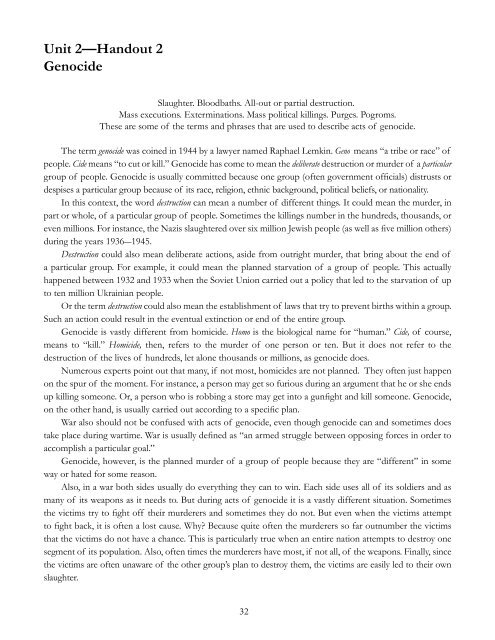Download - Canada ALPHA
Download - Canada ALPHA
Download - Canada ALPHA
You also want an ePaper? Increase the reach of your titles
YUMPU automatically turns print PDFs into web optimized ePapers that Google loves.
Unit 2—Handout 2<br />
Genocide<br />
Slaughter. Bloodbaths. All-out or partial destruction.<br />
Mass executions. Exterminations. Mass political killings. Purges. Pogroms.<br />
These are some of the terms and phrases that are used to describe acts of genocide.<br />
The term genocide was coined in 1944 by a lawyer named Raphael Lemkin. Geno means “a tribe or race” of<br />
people. Cide means “to cut or kill.” Genocide has come to mean the deliberate destruction or murder of a particular<br />
group of people. Genocide is usually committed because one group (often government offi cials) distrusts or<br />
despises a particular group because of its race, religion, ethnic background, political beliefs, or nationality.<br />
In this context, the word destruction can mean a number of different things. It could mean the murder, in<br />
part or whole, of a particular group of people. Sometimes the killings number in the hundreds, thousands, or<br />
even millions. For instance, the Nazis slaughtered over six million Jewish people (as well as fi ve million others)<br />
during the years 1936―1945.<br />
Destruction could also mean deliberate actions, aside from outright murder, that bring about the end of<br />
a particular group. For example, it could mean the planned starvation of a group of people. This actually<br />
happened between 1932 and 1933 when the Soviet Union carried out a policy that led to the starvation of up<br />
to ten million Ukrainian people.<br />
Or the term destruction could also mean the establishment of laws that try to prevent births within a group.<br />
Such an action could result in the eventual extinction or end of the entire group.<br />
Genocide is vastly different from homicide. Homo is the biological name for “human.” Cide, of course,<br />
means to “kill.” Homicide, then, refers to the murder of one person or ten. But it does not refer to the<br />
destruction of the lives of hundreds, let alone thousands or millions, as genocide does.<br />
Numerous experts point out that many, if not most, homicides are not planned. They often just happen<br />
on the spur of the moment. For instance, a person may get so furious during an argument that he or she ends<br />
up killing someone. Or, a person who is robbing a store may get into a gunfi ght and kill someone. Genocide,<br />
on the other hand, is usually carried out according to a specifi c plan.<br />
War also should not be confused with acts of genocide, even though genocide can and sometimes does<br />
take place during wartime. War is usually defi ned as “an armed struggle between opposing forces in order to<br />
accomplish a particular goal.”<br />
Genocide, however, is the planned murder of a group of people because they are “different” in some<br />
way or hated for some reason.<br />
Also, in a war both sides usually do everything they can to win. Each side uses all of its soldiers and as<br />
many of its weapons as it needs to. But during acts of genocide it is a vastly different situation. Sometimes<br />
the victims try to fi ght off their murderers and sometimes they do not. But even when the victims attempt<br />
to fi ght back, it is often a lost cause. Why? Because quite often the murderers so far outnumber the victims<br />
that the victims do not have a chance. This is particularly true when an entire nation attempts to destroy one<br />
segment of its population. Also, often times the murderers have most, if not all, of the weapons. Finally, since<br />
the victims are often unaware of the other group’s plan to destroy them, the victims are easily led to their own<br />
slaughter.<br />
32


